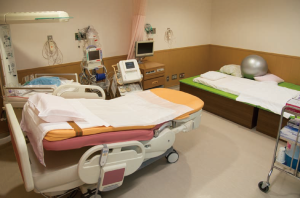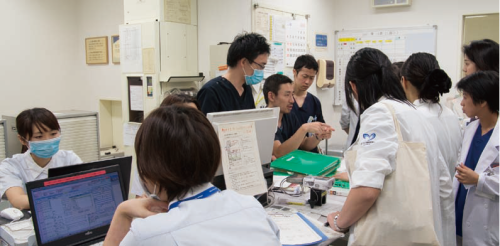Top > About Us > News Letter > In-hospital Midwifery System that Meets the Needs of Each Individual
In-hospital Midwifery System that Meets the Needs of Each Individual
Aiming for Comprehensive Perinatal Care with a High Level of Satisfaction and Quality
The University of Tokyo Hospital is designated as a comprehensive perinatal medical center and is participating in the Japan Obstetric Compensation System.
In this hospital, in addition to pregnant mothers without complications, mothers with high-risk pregnancy or pregnant mothers whose baby has a fetal disease that is indicated for neonatal surgery can also give birth without worries.
We offer continuous care by midwives from during the pregnancy until after giving birth. We have also incorporated an in-hospital midwifery system for pregnant mothers who have a normal pregnancy course.
Here we introduce our in-hospital midwifery.
What is in-hospital midwifery?
In modern Japanese society with a declining birth rate and an increasing number of nuclear families, many people have no experience in childbirth or childcare and the information that can be obtained from other generations or in a local community tends to be less than before. Physicians lead the management of pregnant mothers; however, this is mainly for medical reasons to cope with mothers with an abnormal condition. Therefore, pregnant mothers with a normal pregnancy course tend not to have sufficient information about maternal and child health and their individual needs in social and family environment are not fully satisfied. To respond to such needs, we have incorporated an in-hospital midwifery system.
In-hospital midwifery is a system in which midwives, in cooperation with physicians, provide health checkups, health guidance, birth assistance, and postpartum management to pregnant or nursing mothers with a normal pregnancy course. It includes our midwifery outpatient clinic, in which midwives provide health checkups and health guidance, etc. Midwives have licensure from the Minister of Health, Labour and Welfare, as well as being qualified as nurses. The midwives provide main support for pregnant or nursing mothers and their families from during the pregnancy until after giving birth, so that the mothers can experience a natural childbirth that satisfies their birth plan (i.e., which type of childbirth they wish for) and they can enjoy childcare.

Mothers who can have in-hospital midwifery
- Those who are judged not to have a high-risk pregnancy by their physicians
- Those who wish to have in-hospital midwifery as their families do
- Those who have a single pregnancy and for whom vaginal delivery is judged possible
- Those who do not have premature or post-term delivery
- * If any abnormality is observed in the course of pregnancy and delivery, physicians respond to the situation immediately.
In-hospital midwifery system in the University of Tokyo Hospital: Cooperation between midwives and physicians
Physicians are responsible for the first consultation and the management during the first pregnancy trimester, which are provided in the regular outpatient clinic. The physicians assess a risk related to pregnancy and delivery, e.g., whether it is a high-risk pregnancy and whether it is a single pregnancy and vaginal delivery will be possible. If the physicians judge that the mother can give birth in our in-hospital midwifery system, she is referred to the midwifery outpatient clinic. If she and her family wish for in-hospital midwifery, she continues to visit the midwifery outpatient clinic. Even after she chooses in-hospital midwifery, she has a physician’s outpatient consultation between visits to the midwifery outpatient clinic until the 36th week of pregnancy. Because of cooperation between our midwives and physicians, if any abnormality is observed during the course of the pregnancy or the delivery does not occur before or on the due date, the physicians will be responsible for the care.
In the midwifery outpatient clinic, a mother can have health checkups and health guidance by midwives; in addition, she can have plenty of time in her slot to consult immediate issues based on her pregnancy trimester, including questions about how to build up her body for delivery, the birth plan, or what to do after delivery. To welcome babies, midwives support mothers and their families to imagine their postpartum life while the mothers are pregnant.
Midwives take the initiative in the whole process of delivery, i.e., from admission until after giving birth. Midwives are responsible for consultation at admission and management of the delivery progress. If the course of delivery is normal, only midwives directly assist the delivery, while they are supported by physicians. In case any abnormality is observed in the course of the delivery, physicians respond to the situation immediately. Our hospital has a labor, delivery, and recovery (LDR) room specific for in-hospital midwifery, which can cope with freestyle delivery. In-hospital midwifery provides a mother at childbirth with an environment leading to a comfortable and satisfactory delivery. Midwives also take the initiative in consultation at discharge or a health checkup after one month to confirm the postpartum maternal recovery and to answer questions about childcare and breastfeeding.
General schedule for health checkups for in-hospital midwifery
| Week | 12 | 16 | 20 | 24 | 26 | 28 | 30 | 32 | 34 | 36 | 37~40 | 41~ |
| Doctor | ○ | ○ | ○ | ○ | ○ | ○ | ○ | ○ | ||||
| Midwife | ○ | ○ | ○ | ○ |
Approaches led by midwives
In addition to in-hospital midwifery, we offer continuous care by midwives from during the pregnancy until after giving birth to mothers who will or did give birth in our hospital. For example, midwives actively incorporate the birth plan into the delivery for each mother. They are also responsible for various classes, such as a maternal class (in which a mother can learn about pregnancy, delivery, and childcare), a parents class (in which a father also participates), and a breastfeeding class (for pregnant mothers who wish to breastfeed). In the breastfeeding class, mothers learn how breast milk is produced and which type of breastfeeding troubles tend to occur after delivery, as well as practicing the appropriate breastfeeding posture with a baby-like doll. The breastfeeding outpatient clinic, which is a specialized clinic for breast care, is led by midwives to support breastfeeding after discharge. This class is open for mothers from the time they are discharged after delivery until they complete breastfeeding. Midwives provide appropriate guidance to each individual mother so that her question or concern related to breastfeeding is resolved and any trouble on breasts and nipples can be prevented.
Our in-hospital midwifery system aims to provide comprehensive perinatal care with a high level of satisfaction and quality by meeting the needs of each individual mother with a low-risk pregnancy without impairing the traditional level of pregnancy management led by physicians. Dr. Takeshi Nagamatsu, Lecturer in the Department of Obstetrics and Gynecology, who is promoting the introduction of the in-hospital midwifery system in our hospital, says, “Delivery is an important event for a mother and her family to welcome a new life. I believe that the introduction of the in-hospital midwifery system enables us to provide perinatal care that meets the wishes of each individual pregnant mother, not uniform management. During the course of pregnancy and delivery, even a pregnant mother who has had the normal course may suddenly have an abnormal event. The University of Tokyo Hospital is a comprehensive perinatal medical center and we can handle such emergency events. Therefore, in-hospital midwifery in this hospital provides pregnant mothers with great peace of mind”.

